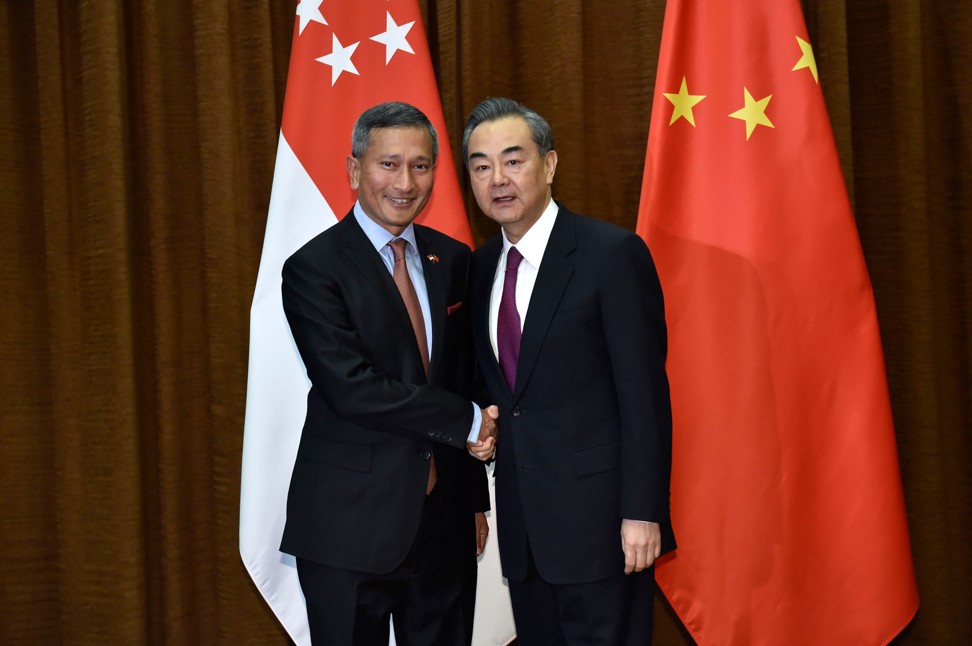
Can China play the globalisation card to win ‘trade war’ allies in Europe?
Beijing’s commitment to a rules-based system with the WTO at its core may be key to swaying European opinion on its spat with Washington, analysts say
China’s leaders are busy shoring up relations with the country’s trading partners in Europe and Asiaas the threat of a trade war with the United States looms and Beijing seeks to cement its position as a bastion of globalisation and free trade.
Analysts said on Monday that Beijing faced both support and opposition in Europe and elsewhere, and would have to work hard to secure support from its allies while appeasing its critics.
Over the weekend, Premier Li Keqiang met United Nations Secretary General Antonio Guterres in Beijing to discuss making globalisation “more open, inclusive, balanced and mutually beneficial”, Xinhua reported on Monday.
While no direct references were made to the US during the talks, Guterres was quoted as saying that protectionism was “injurious to others and oneself”.
In a sign of China’s apparent keenness to build links in western Europe, President Xi Jinping on Sunday met his Austrian counterpart, President Alexander Van der Bellen.
A joint statement issued after the talks in Beijing said the two leaders had agreed to establish a strategic Sino-Austrian partnership, which they would use to “jointly protect the multilateral trade mechanism and build an open economy”, Xinhua reported.
Despite the deal with Vienna, Michael Every, head of Asia-Pacific financial markets research at Netherlands-based Rabobank, said that amid rising tensions with Washington, Beijing might find itself short of allies in Europe.
Both China and the US were trying to build coalitions supporting their view of how the global economic system should operate, he said. The problem for Beijing was that many countries, especially in Europe, had concerns about China’s market access restrictions.
“The number of countries that would like to join against China is long and growing,” Every said. “If Trump plays his cards better … You could end up a with a huge number of countries saying China [should] change the way you do things. I genuinely think that China is in a very dangerous situation here.”
Trump softens on China as Beijing ramps up rhetoric in show of toughness over trade spat
Also on Sunday, Chinese Foreign Minister Wang Yi held talks on trade partnerships with his Singaporean counterpart, Vivian Balakrishnan.
In a thinly veiled reference to the US, the two officials committed to increasing cooperation to battle protectionism and maintain the global trading system with the World Trade Organisation (WTO) at its core, Xinhua said.
Wang was quoted as saying that both China and Singapore were beneficiaries of free trade, and should “join hands to counter protectionism”.
China’s forex reserves are up – and so are fears of a US trade war hit
In the latest salvo in the tit-for-tat trade dispute between Beijing and Washington, US President Donald Trump on Thursday called for tariffs on an extra US$50 billion worth of Chinese goods, saying the United States’ soaring trade deficit with China “cannot continue”.
Beijing blasted Trump’s move as a violation of international trade rules, and vowed to defend its interests “at any cost”.
China-US trade talks hit dead end but ‘there’s still room to move’
Tommy Wu, a senior economist at Oxford Economics, said it was clear Beijing was trying to “take the moral high ground” of the trade issue.
China has consistently portrayed itself as a protector of the global trading system, while trying to paint Trump as a protectionist with his “America first” policy. At the World Economic Forum in Davos last year, Xi attacked critics of globalisation, and described the pursuit of protectionism as akin to “locking oneself in a dark room”.
Every said China ran the risk of losing support in Europe because of its restrictive trade practices.
But Allan von Mehren, chief China economist at Danske Bank Markets, added that Beijing’s insistence on “playing by the rules” could in turn help it to win back some detractors on the continent.
“China will insist that any trade deals are done via the global multilateral rules system and wants to show that unilateral action will not work,” he said.
“This is an important principle, and an area where the EU and other countries are on China’s side.”
Without a clear framework, countries risked “opening up a Pandora’s box that will undermine the rule-based multilateral system”, he said.
Beijing was unlikely to give any ground on the issue, von Mehren said.
“I think [Trump] may back down soon and they will end up at the negotiating table. But China is likely to insist it is a table that is centred on the WTO.”
US and China must step back from brink of trade war, says Dutch Prime Minister
Meanwhile, the strengthening of ties between China and Singapore was indicative of China’s growing influence in Southeast Asia, and a sign of how reliant many countries in the region were on Beijing, said Sarah Yueting Tong, a senior research fellow at the East Asian Institute in the city state.
“Part of why Singapore has committed to work with China, and also with others, is to protect the openness of globalisation,” she said.
“More punitive measures … are in no one’s interests, as they are damaging not only to those directly involved, but also to other countries, because they are not just trading with each other, they’re trading with the world.”


